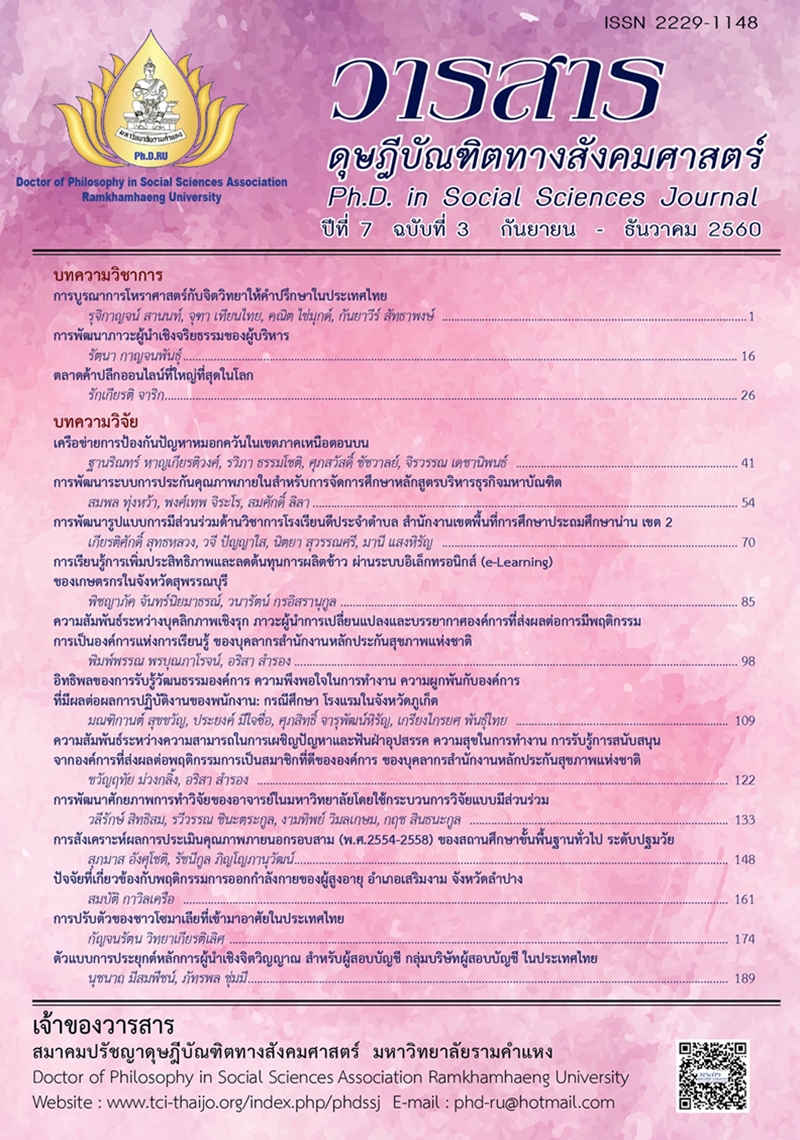การปรับตัวของชาวโซมาเลียที่เข้ามาอาศัยในประเทศไทย
Main Article Content
Abstract
การวิจัยครั้งนี้ มีวัตถุประสงค์เพื่อศึกษาปัจจัยที่ตัดสินใจมาใช้ชีวิตประจำวันในประเทศไทย การเตรียมความพร้อมในการเดินทางมายังประเทศไทย การปรับตัวในการมีชีวิตในสังคมไทย รายได้-รายจ่ายของชาวโซมาเลียในการใช้ชีวิตอยู่ในสังคมไทย ประวัติชีวิตของชาวโซมาเลียในประเทศต้นทางและประเทศไทย และผลกระทบในเชิงบวกและเชิงลบในการเข้ามาอยู่อาศัยในประเทศไทย
ผู้วิจัยใช้ระเบียบวิจัยเชิงคุณภาพทางมานุษยวิทยาในการเก็บรวบรวมข้อมูล ประกอบด้วย (1) การสังเกตอย่างมีส่วนร่วม (2) การสัมภาษณ์ผู้ให้ข่าวสำคัญ (3) การสัมภาษณ์แบบเจาะลึก (4) การสังเกตทั่วไป (5) การสัมภาษณ์อย่างไม่เป็นทางการ (6) การสำรวจลักษณะทางกายภาพและสิ่งแวดล้อมของชุมชน (7) การเก็บประวัติชุมชน (8) การทำไดอะแกรมเครือญาติ (9) เครื่องมือทางเทคโนโลยีในงานวิจัยสนามทางมานุษยวิทยา และ (10) การจดบันทึกสนาม
ส่วนการวิเคราะห์ข้อมูลอาศัยวิธีทางมานุษยวิทยา โดยหลังการเก็บรวบรวมข้อมูลแล้ว นำมาเสนอในลักษณะเชิงพรรณนาความ และวิเคราะห์เนื้อหา
ผลการวิจัย พบว่า สิ่งที่ทำให้ชุมชนไม่มีผลกระทบจากการมาใช้ชีวิตอาศัยในชุมชนธรรมานุรักษ์ นั่นก็คือ “หลักศาสนาอิสลาม” ที่เป็นตัวบังคับให้ชาวโซมาเลียที่มาอยู่นั้นไม่มีปัญหาหรือผลกระทบกับในชุมชน เพราะหลักศาสนาอิสลามจะเคร่งครัดในเรื่องของการปฏิบัติและดำรงชีวิต นอกจากนี้ การอยู่ในการควบคุมหรือดูแลของสหประชาชาติ เพราะชาวโซมาเลียที่เข้ามาอาศัยในประเทศไทยเนื่องมาจากการลี้ภัยสงคราม และต้องการมาอาศัยอย่างปลอดภัยและสงบจากประเทศที่สาม นั่นก็คือประเทศไทย ดังนั้น พวกเขาจึงไม่ต้องการที่จะมีปัญหาในประเทศที่สามอีก มิฉะนั้นก็จะถูกส่งตัวกลับประเทศโซมาเลีย ซึ่งก็ไม่เป็นผลดีต่อตัวเขาเอง
THE ADJUSTMENT OF SOMALIS RESIDING IN THAILAND
In this research investigation, the researcher studies factors that led Somalis to decide to live in the Kingdom of Thailand (Thailand). The researcher also examines the preparations they made for traveling to Thailand; the adjustments they have made in order to live in Thai society; the income the Somalis enjoy and the expenses they incur in Thailand; and their life histories both in Somalia and in Thailand. Finally, the researcher considers the positive and negative effects on the Somalis of residing in Thailand.
In carrying out this investigation, the researcher applied anthropological qualitative research methods in order to collect germane data. These methods were (1) participatory observation; (2) interviewing key informants; (3) in-depth interviews; (4) general observation;
(5) informal interviews; (6) a survey of physical characteristics and the community environment; (7) collecting community histories; (8) drawing up a kinship system diagram; (9) technological tools used in anthropological field research; and (10) recording field work.
The data collected were analyzed using anthropological methods. After data collection, the data were presented in a descriptive manner and subjected to content analysis.
Findings are as follows:
The Thanmanurak community in which the Somalis resided did not bear any adverse effects on them because they lived in accordance with “Islamic principles.” The Somalis did not encounter problems, nor did they adversely affect the community in which they resided, inasmuch as they adhered to strict Islamic principles in practical life. In addition, they are under the control or care of the United Nations (UN), since they are war refugees. They want to reside safely and peacefully in their third country, viz., Thailand. They do not want to have any problems in their third country; otherwise, they will be sent back to Somalia, which would have seriously adverse effects on them.
Article Details
Academic articles, research articles, and book reviews in the Ph.D. in Social Sciences Journal are author’s opinions, and not the publisher’s, and is not the responsibility of the Ph.D. in Social Sciences Journal Philosophy Association, Ramkhamhaeng University. (In the case that research is done on human, the researcher has to be trained in Ethics for Doing Research on Human Training and has to produce the evidence of the training).


